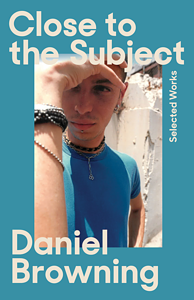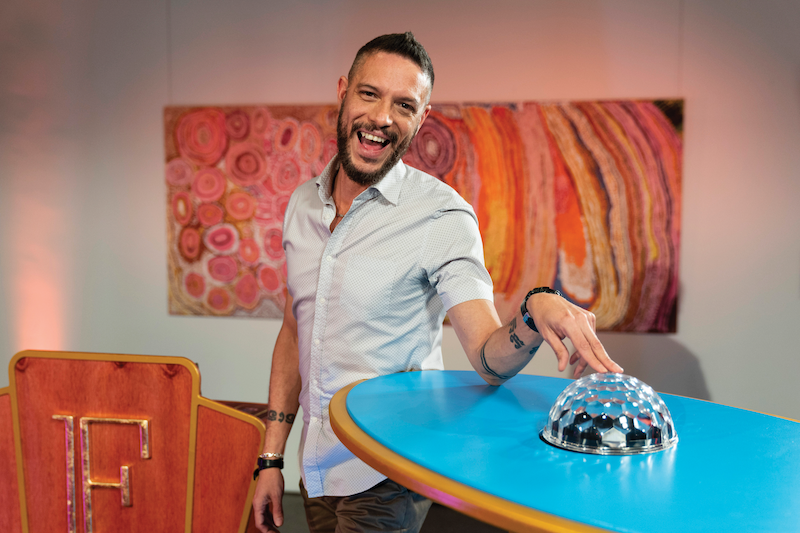As host of Awaye! on ABC Radio National for 15 years and now The Arts Show, and as Editor Indigenous Radio (ABC), your broadcasting presence has been constant, self-contained and gentle yet authoritative. What drives that?
If I created this job, I would say that people are now interested in the Aboriginal point of view, which is fantastic. And they have realised that the kind of critique and analysis we can provide, particularly in regard to visual art, can deepen our understanding.
Art is not just a commodity to be bought and sold. Its real purpose is in communicating things that are beyond words. Artists are communicating a message that we can’t ignore, that we can’t not listen to. And in that mediation between the message and the artist is a journalist.
I try to take my university training as an artist into each interview. I feel empathy with artists and always think about how hard it is to do their job – because they’re the ones telling us where to look. We don’t have prophets or seers or magicians or people that we believe in, or even the church. So in this world, we have to have something other than the conventional channels, and artists have always delivered that kind of critique. The best ones talk about what is happening with black fellas, what we are and where we came from. And this is still not widely understood in Australia.
I’m proud of the collective effort of those programs, what I hope they have contributed. And it’s never just me; it’s not my work. It belongs to those guests, and now it’s up to the readers. Let’s not have people say in the future, “I don’t know/I’ve never heard/never met an Aboriginal person,” and make that excuse. That’s what is going to compel me for the next many years.
What makes you proudest of the work you’ve done to date?
I think about legacy because I’m a single, middle-aged gay man. So, on the face of it, I’m not leaving behind a legacy like a little Daniel. Instead, I think, “What am I working for? What would my nieces and nephews and my godson say if someone asked, ‘Who’s your Uncle Daniel? What kind of man was he?’” I just want to be thought of as an honourable ancestor. That sounds really high and worthy; it’s just that’s what I feel for my people, my people before me, and I want to be regarded the same.
Your European trip sees you following a story that found you more than 15 years ago. What is compulsive in the dual narratives you are documenting?
It’s called Parallel Lives, the cases of two Aboriginal men who came – independently of each other – to Europe in 1824. They’re not well known, they’re not remembered, and that bothers me because they did something brave, something unusual.
I want to celebrate it and find out what it tells us about Aboriginal people. How does it challenge what we think we know about our past, our ancestors? I hope to spend two or three years on this work, as it’s really important to me. It’s like I’m bringing it to light, and the men are present in the process. I’ve got no doubt about that. I think it will be a book for everyone: a story of today.
You have created a niche in Australian reportage. How have you negotiated this novel path in a journalistic world that’s not designed for your approach to the subject?
I guess what journalism should do is up for debate; there are all kinds of styles. I absolutely agree that you are the least important person in the room. In an interview setting, you get straight to the subject. There are definitely times where I’ve excluded myself and lost good stories or lost access to certain things because I was reluctant to fall into subjective journalism. I’m aware that you can’t throw something out because it’s too close to its subject and say to Aboriginal journalists, “Your work has no value; you are too close to your subject.”
The media has a role to play in the way we’re representing black fellas, to short circuit the racism. Programs were introduced to diversify newsrooms. On matters of race, it’s very difficult to break a thought pattern about what’s right and what’s wrong. And so often, Aboriginal people are seen to be wrong and dysfunctional, needing to be questioned, should not be given the benefit of the doubt. That’s a view that was familiar to me. We talk about shame, but it wasn’t within the community – it was definitely from without.
I have a tendency to say unpopular things and to be the least liked person in the room. When I ended up in journalism, I tried to be real and a black fella all the time. I am, and I can’t help that, and I don’t let go of it. When I’m interviewing, I never let go of that. But I do let go of being a journalist. I’m not a journalist all the time.
Above: Daniel Browning on the set of the art quiz show Faboriginal at the Art Gallery of New South Wales in 2019. Photo: Kelly Gardner. Courtesy: Noble Savage Pictures, AGNSW and NITV.

The cover of Daniel Browning’s first book, an anthology of his published writing on contemporary Indigenous art, memoir, unpublished poetry and his first attempt at playwriting, published by the Indigenous-owned Magabala Books. Cover image: Karen Barlow. Courtesy: the artist.

